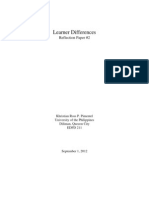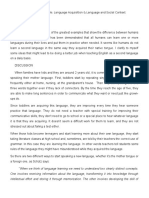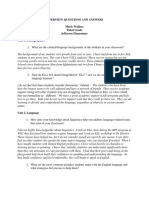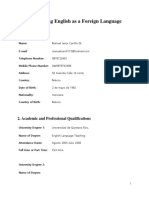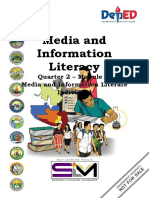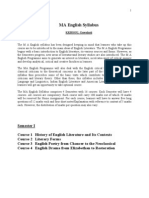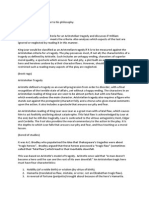0 ratings0% found this document useful (0 votes)
45 viewsPhase 1 Foreing Language
Phase 1 Foreing Language
Uploaded by
Daniela1) The document discusses a student's reflection on Krashen's hypotheses of foreign language acquisition and learning.
2) The student believes Krashen's acquisition-learning distinction hypothesis best describes how they learn, through formal instruction and using the language in context.
3) The student answers three questions on how additional languages are learned, factors that influence learning rates, and what is needed to attain advanced competency in a non-native language.
Copyright:
© All Rights Reserved
Available Formats
Download as DOCX, PDF, TXT or read online from Scribd
Phase 1 Foreing Language
Phase 1 Foreing Language
Uploaded by
Daniela0 ratings0% found this document useful (0 votes)
45 views3 pages1) The document discusses a student's reflection on Krashen's hypotheses of foreign language acquisition and learning.
2) The student believes Krashen's acquisition-learning distinction hypothesis best describes how they learn, through formal instruction and using the language in context.
3) The student answers three questions on how additional languages are learned, factors that influence learning rates, and what is needed to attain advanced competency in a non-native language.
Original Title
Phase 1 foreing language
Copyright
© © All Rights Reserved
Available Formats
DOCX, PDF, TXT or read online from Scribd
Share this document
Did you find this document useful?
Is this content inappropriate?
1) The document discusses a student's reflection on Krashen's hypotheses of foreign language acquisition and learning.
2) The student believes Krashen's acquisition-learning distinction hypothesis best describes how they learn, through formal instruction and using the language in context.
3) The student answers three questions on how additional languages are learned, factors that influence learning rates, and what is needed to attain advanced competency in a non-native language.
Copyright:
© All Rights Reserved
Available Formats
Download as DOCX, PDF, TXT or read online from Scribd
Download as docx, pdf, or txt
0 ratings0% found this document useful (0 votes)
45 views3 pagesPhase 1 Foreing Language
Phase 1 Foreing Language
Uploaded by
Daniela1) The document discusses a student's reflection on Krashen's hypotheses of foreign language acquisition and learning.
2) The student believes Krashen's acquisition-learning distinction hypothesis best describes how they learn, through formal instruction and using the language in context.
3) The student answers three questions on how additional languages are learned, factors that influence learning rates, and what is needed to attain advanced competency in a non-native language.
Copyright:
© All Rights Reserved
Available Formats
Download as DOCX, PDF, TXT or read online from Scribd
Download as docx, pdf, or txt
You are on page 1of 3
Foreign Language Acquisition and Learning
Phase 1 Initial Evaluation
Elaborado por:
Daniela Murillo Martínez
Código: 1001204596
Grupo: 4
Tutor: Edith Grande
Septiembre 2020- Bogotá
Universidad Nacional Abierta y a Distancia. UNAD
Escuelas de Ciencias en La Educación ECEDU
Licenciatura en Lenguas Extranjeras con énfasis en inglés.
Personal introduction
My name is Daniela Murillo I am nineteen years old and I am from
Bogotá, I am in the fourth semester of a Bachelor's Degree in Foreign
Languages with an emphasis in English, I worked in a concert
logistics company, but now I only dedicate myself to my study due to
the quarantine. I hope to make good use of the course. Thank you
very much
Reflection on Krashen’s Hypotheses.
I consider that the hypo thesis that best describes my learning
process is the first one. The acquisition-learning distinction, this
hypothesis exposes us two ways and the one that defines me is the
second, where I understand through the situation, the context, the
extralinguistic information and the knowledge of the formal rules of
languages and the ability to verbalize them. I learn more in this way
because when a teacher teaches me and / or I write the forms and
rules of the second language and I study them, I consider that I learn
more about that subject. The first way in this hypo thesis is to learn
unconsciously, in this way I have realized that I learn vocabulary and
pronunciation a lot, for example when I listen to music and watch
movies and series I unconsciously memorize it, I realize of it because
when I do my work and others I recognize a lot of vocabulary and
pronunciation.
Answers to the three questions.
1. How do humans learn additional languages after they have learned
their first?
I consider that as we learn the first language and / or our mother
tongue, we learn a second and the others that we want to learn,
obviously it is going to make it a bit more difficult because learning
something new so complex for some causes us fear and we also tend
to faint from it. simple fact that it seems difficult to us, and it will not
be completely the same because normally when they teach us
English, they make us learn their rules first and the grammar part at
that moment is when learning a new language becomes complicated.
But not all of us will learn the same because there are some who
learn as it was spoken in the first theory where some people
unconsciously learned the same with our mother tongue.
2. What factors contribute to the variability observed in rates and
outcomes of second language learning?
The social context is an important factor because the environment in
which learning takes place is fundamental, for example, in the
classrooms of public schools we see that the classrooms have over
population and this causes that attention is sometimes diverted. The
socioeconomic factor is also linked to this factor since we see that
people prefer to pay for an expensive school to learn their second
language, we tend to represent that the more money and the more
expensive something is, the better the final result or the product we
acquire.
The characteristics of the individual is also one of the most important
factors because it will depend on how it will be taught, at what pace
and perhaps for how long, it influences: Personality, affective and
cognitive characteristics, age, disposition and motivation.
Another factor is the learning process. Because, as I said before, not
all of us learn the same and that is where we enter to play the
strategies, techniques and mental operations for teaching.
3. What does it take to attain advanced language and literacy
competencies in a language other than the mother tongue?
I consider that he practices a lot of practice and patience, as when we
were children we learned to write and read, our parents or an adult
taught us and at first it seemed very difficult, but after practicing we
saw that we began to read and write more fluently, after it was not
forced and we could already do it automatically, this is how it would
also be done in the acquisition of a second language.
Reference
Krashen, S. (2009). Principles and Practice in Second Language
Acquisition. University of Southern California.9-
45. http://www.sdkrashen.com/content/books/principles_and_practic
e.pdf
You might also like
- Iris Module Katie HearlDocument3 pagesIris Module Katie Hearlapi-413321110100% (4)
- Oration On The Dignity of ManDocument3 pagesOration On The Dignity of MangoldfishxNo ratings yet
- Introducing Translation Studies - Chapter 1Document11 pagesIntroducing Translation Studies - Chapter 1Ayşenur Yazgan100% (1)
- TEFL Entrance ExamDocument3 pagesTEFL Entrance ExammerekNo ratings yet
- Teacher Training Materials EditDocument105 pagesTeacher Training Materials EditYusran Bakri0% (1)
- Lesson Plan in ArtsDocument9 pagesLesson Plan in Artsjoeven100% (2)
- Mission To Mars RubricDocument1 pageMission To Mars Rubricapi-302124422No ratings yet
- Phase 1 - DANIELA BANDERADocument7 pagesPhase 1 - DANIELA BANDERADaniela Bandera H.No ratings yet
- Reflection Paper 2Document10 pagesReflection Paper 2Khristian RossNo ratings yet
- ELL Testing Evaluation Assignment 1.1 Language SummaryDocument2 pagesELL Testing Evaluation Assignment 1.1 Language Summaryjennifer.knightNo ratings yet
- 518015-Task 1Document6 pages518015-Task 1Genny RincónNo ratings yet
- Assignment 2 Write An Essay On The SeconDocument6 pagesAssignment 2 Write An Essay On The SeconMohamed BdiouiNo ratings yet
- Task 1 Foreing Languaje Acqusition and LearningDocument5 pagesTask 1 Foreing Languaje Acqusition and LearningAngela AvilezNo ratings yet
- Task 1 Foreing Languaje Acqusition and LearningDocument5 pagesTask 1 Foreing Languaje Acqusition and LearningAngela AvilezNo ratings yet
- Phase 1 Initial Evaluationaudio Recording: Group: 518015 - 11Document5 pagesPhase 1 Initial Evaluationaudio Recording: Group: 518015 - 11ayeyi rcsgcNo ratings yet
- Activity Guide and Evaluation Rubric Phase 1-Initial EvaluationDocument7 pagesActivity Guide and Evaluation Rubric Phase 1-Initial Evaluationsebastian guerreroNo ratings yet
- QUESTIONNAIRE3Document3 pagesQUESTIONNAIRE3Luciana ChiloNo ratings yet
- Language Learning and AcquisitionDocument3 pagesLanguage Learning and AcquisitionErwin Santana OrtegaNo ratings yet
- NCTE Content Folio AppendixDocument166 pagesNCTE Content Folio AppendixBrianna RestoNo ratings yet
- Portfolio Lola DiazDocument7 pagesPortfolio Lola DiazLola Díaz PrietoNo ratings yet
- 1.background To Language LearningDocument12 pages1.background To Language LearningNariţa GeorgianaNo ratings yet
- Tema 2Document11 pagesTema 2IsaM.SalasNo ratings yet
- EDRADAN - Multilingualism in The ClassroomDocument4 pagesEDRADAN - Multilingualism in The ClassroomFriedrich Carlo Jr. EdradanNo ratings yet
- Methods and Approaches of Teaching English: Unit - 4Document21 pagesMethods and Approaches of Teaching English: Unit - 4Abdalan da GamaNo ratings yet
- Read The Following Assumptions About Language Learning and Teaching and Discuss Whether The Author AgreesDocument10 pagesRead The Following Assumptions About Language Learning and Teaching and Discuss Whether The Author Agreesanhthu4800No ratings yet
- Interview Questions and Answers Marie Wallace Third Grade Jefferson Elementary Unit 1. DemographicsDocument3 pagesInterview Questions and Answers Marie Wallace Third Grade Jefferson Elementary Unit 1. Demographicsapi-395837744No ratings yet
- Factors Affecting and Influencing Second Language AcquistionDocument12 pagesFactors Affecting and Influencing Second Language AcquistionAmna ShahidNo ratings yet
- The Progressive Teacher Says ' Emphasize The Production of Effective Sentences Rather Than Their Analysis."Document4 pagesThe Progressive Teacher Says ' Emphasize The Production of Effective Sentences Rather Than Their Analysis."サシンゴ ラアーニNo ratings yet
- Assignment 2 - Second Language Acquisition - Deadline 23rd SeptemberDocument6 pagesAssignment 2 - Second Language Acquisition - Deadline 23rd SeptemberMc ReshNo ratings yet
- Essay English Language (Easy To Learn)Document4 pagesEssay English Language (Easy To Learn)Muhammad AsadNo ratings yet
- Applied Linguistics EssayDocument3 pagesApplied Linguistics EssayJuan Da GutierrezNo ratings yet
- Final Project Interview A Language LearnerDocument15 pagesFinal Project Interview A Language LearnerVanora MirandaNo ratings yet
- Ling 423 Final - SJDocument5 pagesLing 423 Final - SJapi-212639150No ratings yet
- Children VS Adults Second Language Learn 1Document6 pagesChildren VS Adults Second Language Learn 1Richard TumentalongNo ratings yet
- First Second and Foreign Language LearniDocument16 pagesFirst Second and Foreign Language LearniAnjaniNo ratings yet
- Edu 435 Final Reflection PaperDocument7 pagesEdu 435 Final Reflection Paperapi-666223893No ratings yet
- The Factors That Influence The Acquisition of A Second LanguageDocument10 pagesThe Factors That Influence The Acquisition of A Second LanguagebelenNo ratings yet
- Project Colaborative LearningDocument21 pagesProject Colaborative LearningRicardo AmórteguiiNo ratings yet
- The Second Language Acquisition Process Differs From The First Language Acquisition in Most CasesDocument42 pagesThe Second Language Acquisition Process Differs From The First Language Acquisition in Most CasesSyafaruddin MarpaungNo ratings yet
- Foreign Language Acquisition and LearningDocument3 pagesForeign Language Acquisition and LearningRosalinda PerezNo ratings yet
- An Introduction To Teaching English To Young Learner1Document14 pagesAn Introduction To Teaching English To Young Learner1Renzo LeonNo ratings yet
- Tovar Sheila Teacher - S Point of View On Some Myths When Learning A Second LanguageDocument6 pagesTovar Sheila Teacher - S Point of View On Some Myths When Learning A Second LanguageSHEILA JULIANA TOVAR RODRIGUEZNo ratings yet
- 2 - General Theories About Learning and Acquisition of A Foreign LanguageDocument5 pages2 - General Theories About Learning and Acquisition of A Foreign LanguageRobertoNo ratings yet
- Children Vs Adult in SLADocument8 pagesChildren Vs Adult in SLACindra WahyuniNo ratings yet
- Some Experts Believe That It Is Better For Children To Begin Learning A Foreign Language at Primary School Rather Than Secondary SchoolDocument6 pagesSome Experts Believe That It Is Better For Children To Begin Learning A Foreign Language at Primary School Rather Than Secondary Schooldolly bennetNo ratings yet
- Uligan, Rose Angela FINAL PAPERDocument12 pagesUligan, Rose Angela FINAL PAPERroseNo ratings yet
- ExamDocument10 pagesExamhell oNo ratings yet
- Acquiring English As A Second Language1Document1 pageAcquiring English As A Second Language1Mario David Mondragon LinaresNo ratings yet
- Age As A General Psychological FactorDocument7 pagesAge As A General Psychological FactorАйгера МерейNo ratings yet
- Teaching English To ChildrenDocument5 pagesTeaching English To ChildrenOkne Putri ArmadanaNo ratings yet
- Unit 1: Introduction: Pre-Chapter QuestionsDocument116 pagesUnit 1: Introduction: Pre-Chapter QuestionsFranco KaaminoNo ratings yet
- Factors Affecting Language Learning ProcessDocument4 pagesFactors Affecting Language Learning ProcessThamayanthi Krishna Radi100% (2)
- Ernesto Macaro Learning Strategies in Foreign and Second Language Classrooms - The Role of Learner Strategies 2001Document291 pagesErnesto Macaro Learning Strategies in Foreign and Second Language Classrooms - The Role of Learner Strategies 2001demestrado100% (2)
- Mungala Mary Special Education AssignmentDocument6 pagesMungala Mary Special Education AssignmentNick LunguNo ratings yet
- PGSD Modul Tefl Session 2Document15 pagesPGSD Modul Tefl Session 2Masjid ManbaussalamNo ratings yet
- Term Paper About Mother TongueDocument7 pagesTerm Paper About Mother Tongueafdtrtrwe100% (1)
- Methods and Approaches of Teaching English PDFDocument21 pagesMethods and Approaches of Teaching English PDFBelenVettese95% (20)
- Paper - Teaching English To Young LearnersDocument14 pagesPaper - Teaching English To Young LearnersKholifatun Ni'mahNo ratings yet
- Green Publication,+journal+manager,+300 Article+Text 599 1 10 20180510Document7 pagesGreen Publication,+journal+manager,+300 Article+Text 599 1 10 20180510charles ndigweNo ratings yet
- Introduction To A Second Language Acquisition Final CuetionaryDocument11 pagesIntroduction To A Second Language Acquisition Final CuetionaryByron PintadoNo ratings yet
- Artifact 2Document6 pagesArtifact 2api-320101338No ratings yet
- ScriptDocument1 pageScriptNhã Nhã Huỳnh ThịNo ratings yet
- Me Il Enrolment Form 2Document8 pagesMe Il Enrolment Form 2Manuel CarrilloNo ratings yet
- Construcción de Edificaciones InglesDocument3 pagesConstrucción de Edificaciones InglesDanielaNo ratings yet
- Task 7 - Comparatives and Superlatives. Daniela Murillo Martinez English Ii Tutora. Olga Lucia FierroDocument5 pagesTask 7 - Comparatives and Superlatives. Daniela Murillo Martinez English Ii Tutora. Olga Lucia FierroDanielaNo ratings yet
- Introduct. To Linguistics Paso 4Document5 pagesIntroduct. To Linguistics Paso 4DanielaNo ratings yet
- Introduccion Linguistics 1Document5 pagesIntroduccion Linguistics 1DanielaNo ratings yet
- SLM - Ro - Mil-Q2 Module 3Document20 pagesSLM - Ro - Mil-Q2 Module 3Bill Villon80% (30)
- Language Teaching. London: LongmanDocument6 pagesLanguage Teaching. London: LongmanLệ NhậtNo ratings yet
- Branches of PhilosophyDocument2 pagesBranches of PhilosophyMary GleyneNo ratings yet
- Proceedings LAMAS 5 2015 Edisi Revisi. Raheni Suhita, Djoko Sulaksono, Kenfitria Diah WDocument27 pagesProceedings LAMAS 5 2015 Edisi Revisi. Raheni Suhita, Djoko Sulaksono, Kenfitria Diah WAdam DamanhuriNo ratings yet
- Additional Family Info ChrisDocument1 pageAdditional Family Info ChrisJun BauagNo ratings yet
- Olathe Noon Rotary Scholarship ApplicationDocument4 pagesOlathe Noon Rotary Scholarship ApplicationNatalie RyanNo ratings yet
- Yasmin Akhtar - Speech Therapy For Kids - Libgen - LiDocument84 pagesYasmin Akhtar - Speech Therapy For Kids - Libgen - Liickng7100% (1)
- 1 Jinnah Final, DR SafdarDocument16 pages1 Jinnah Final, DR SafdarKhushbakht KhushiNo ratings yet
- Dramaclasssyllabus 2018 NdsDocument2 pagesDramaclasssyllabus 2018 Ndsapi-267523655No ratings yet
- Teaching Tactics and Teaching Strategy: Arthur W. Foshay'Document4 pagesTeaching Tactics and Teaching Strategy: Arthur W. Foshay'Ahmed DaibecheNo ratings yet
- TR Electrical Installation and Maintenance NC IVDocument115 pagesTR Electrical Installation and Maintenance NC IVAljon BalanagNo ratings yet
- C9LLBCh6a My Childhood PDFDocument26 pagesC9LLBCh6a My Childhood PDFPieNo ratings yet
- FP 19.1 Spring1999 PDFDocument161 pagesFP 19.1 Spring1999 PDF-No ratings yet
- PISA Chapter 1Document12 pagesPISA Chapter 1EmilyNo ratings yet
- Media Hot and CoolDocument23 pagesMedia Hot and CoolamirtaroNo ratings yet
- Pragmatic Differences On Politeness in English and ChineseDocument20 pagesPragmatic Differences On Politeness in English and Chineseapi-456438584No ratings yet
- Soas CulturalDocument10 pagesSoas Culturalmoebius70No ratings yet
- Kybernetes: Article InformationDocument13 pagesKybernetes: Article InformationRobert VasileNo ratings yet
- The Hellenization Process and The BalkanDocument21 pagesThe Hellenization Process and The BalkanAleksandar TasićNo ratings yet
- MA English SyllabusDocument61 pagesMA English SyllabusMukesh BishtNo ratings yet
- Tribal Religions in IndiaDocument4 pagesTribal Religions in IndiaAbhinavow SinghNo ratings yet
- Anthropology of Religion Magic and Witchcraft 3rd Edition Stein Test Bank Full Chapter PDFDocument32 pagesAnthropology of Religion Magic and Witchcraft 3rd Edition Stein Test Bank Full Chapter PDFgrainnedatw9r2100% (17)
- Worksheet 1Document2 pagesWorksheet 1danciu_alina_florinaNo ratings yet
- 1 cs626 Intro 27jul22Document44 pages1 cs626 Intro 27jul22chandraNo ratings yet
- Heritage Notes Form 1-4Document122 pagesHeritage Notes Form 1-4Takudzwa MlamboNo ratings yet
- Aristotelian Reading of King LearDocument2 pagesAristotelian Reading of King LearbNo ratings yet








